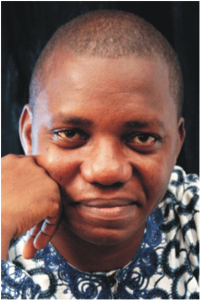
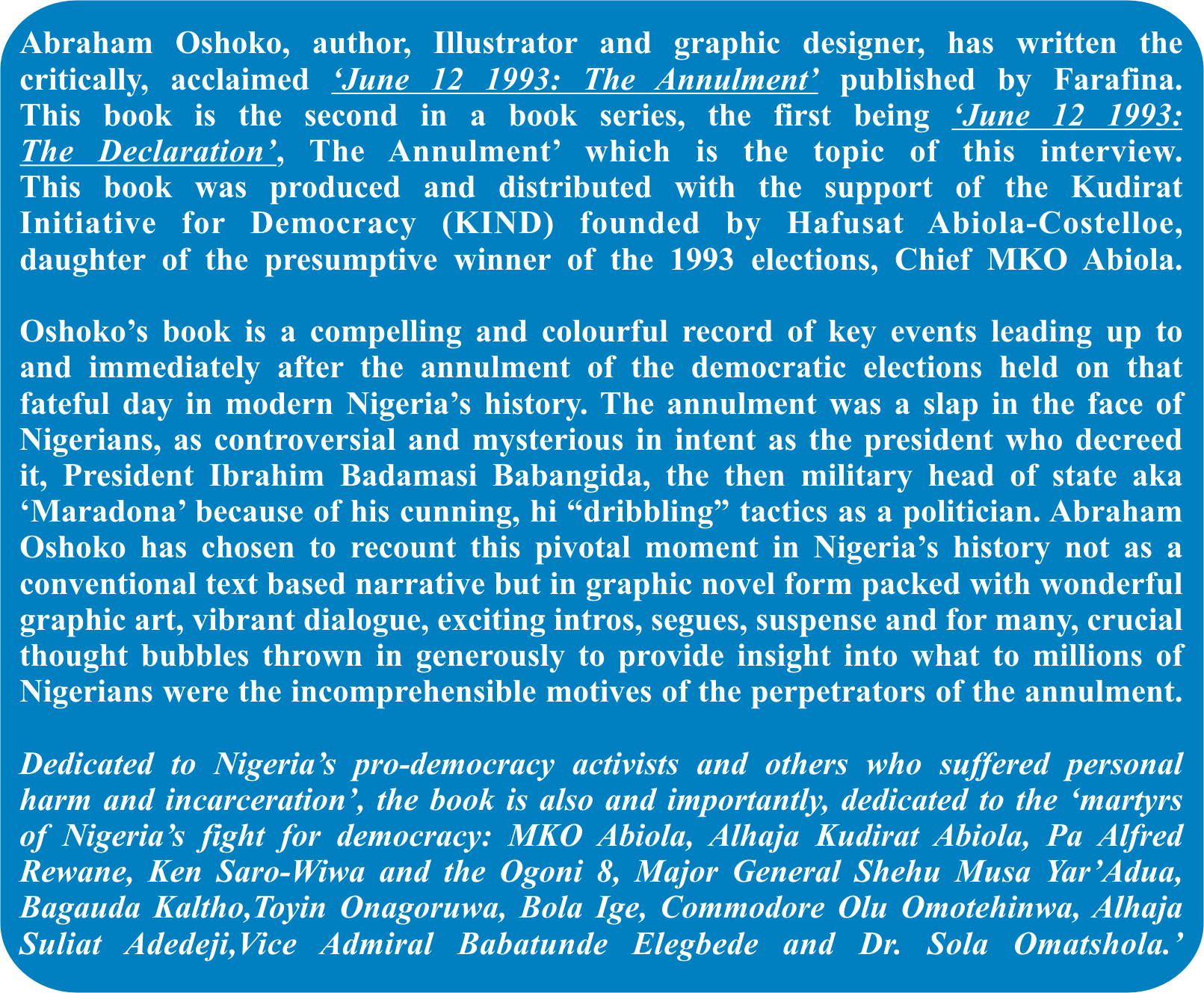

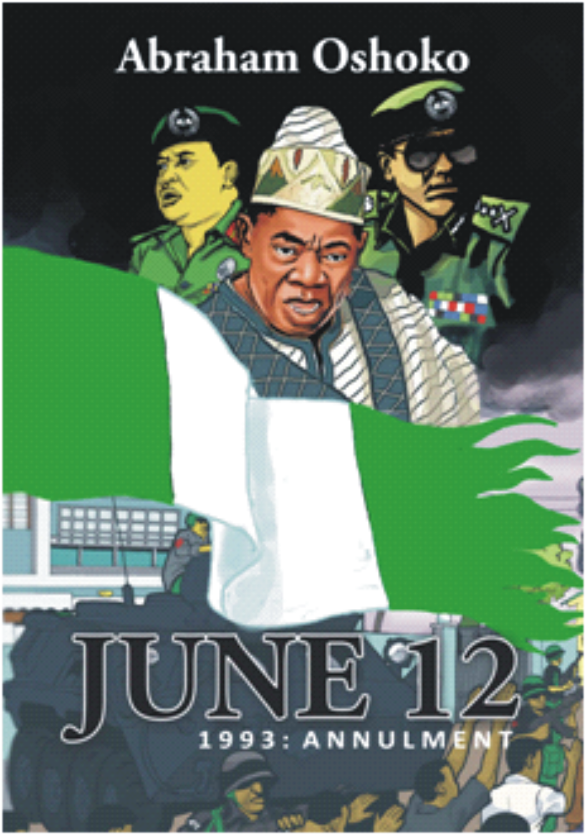
Before we go into a discussion about The Annulment, tell us a little about your background, education, profession and your passions.
Well, I began to draw from the age of four or five having been inspired by a bubble gum with clippings of cowboys and red Indians in gunfights. I had my nursery and primary education in Lagos but my secondary education was in a boarding school in Ogun state. I proceeded to Yabatech to study fine art and later dropped out (after my OND) primarily because the school and other Nigerian higher institutions weren't offering cartooning, I later did a long distance learning cartooning course with the Joe kubert School of cartoon and Graphics Art in the U.S.
I've worked in different organizations like ZMirage (as a scenic artist), Calabash Magazine (as a Lead Illustrator), Pandora Comics (as a production Manager), Kachifo Ltd (as a Graphic designer); I'm currently working with Tick Tock Ltd as the Art Director.
I'm very passionate about African Art. I believe there are huge untapped creative resources in African history and amongst other things, I want to dedicate myself to chronicling African history in Graphic Novel format. My latest work is a Graphic novel titled: INVERTED PYRAMID, volume 1; based on the novel with the same name, written by Emeka Dike.
I'm also currently working on the next volume of the June 12 graphic novel.

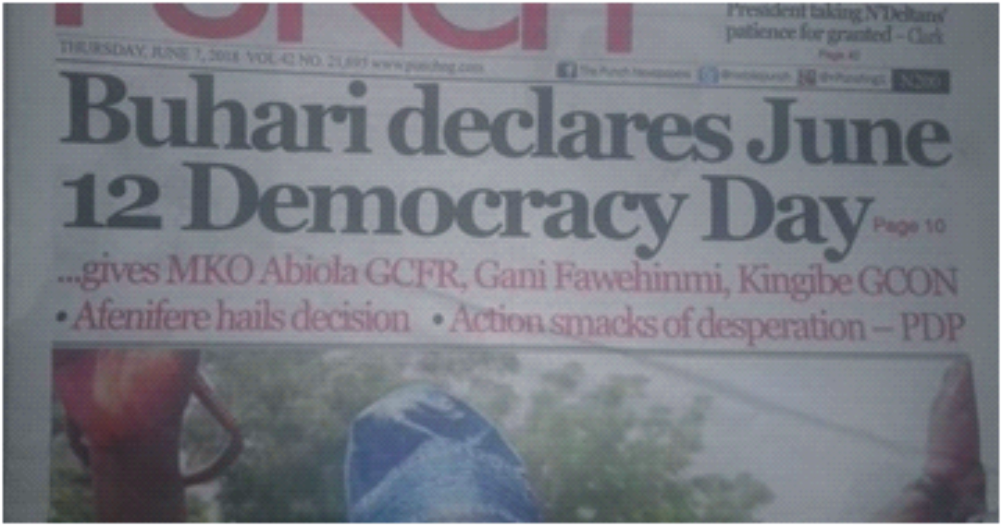
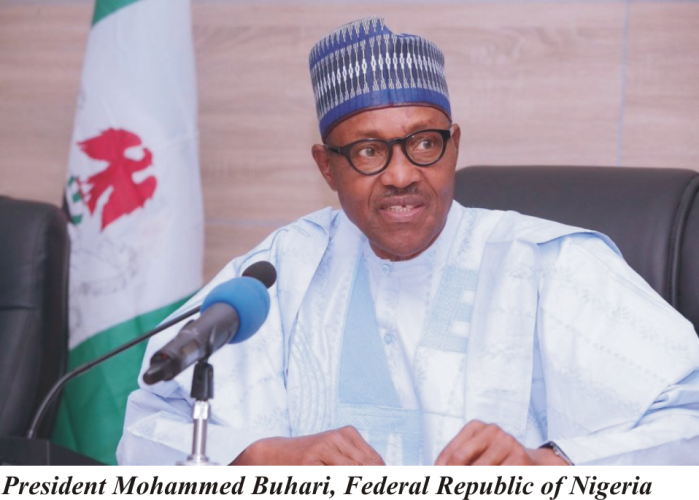
June 12 1993: The Annulment
Why was chronicling this particular aspect of Nigeria’s history, popularly known as ‘June 12’, so important to you?
The June 12 election was the freest, fairest and most peaceful election in Nigerian history and all of a sudden, on June 26th 1993, it was annulled with callous impunity. Although General Babangida gave reasons, but all the reasons were hollow. There was a disconnect. Nigerians knew something else was going on even though they never knew what. All they could rely on were rumours and mere hearsay.
Someone had to painstakingly chronicle what really happened for the sake of posterity and evolution of our democratic process. It was also necessary to kind of 'fill in the gap' for every adult who lived through that bitter experience without having the full picture of why the nation was needlessly thrown into crisis.
I also want to appreciate Muhtar Bakare who challenged me to tell an unbiased, objective and the true story of what really happened.

Why did you choose a graphic novel rather than conventional text based narrative?
Several books have been written about June 12, yet most of our people still don't know what really happened. This is because there is a global reading apathy. However, people can't resist a well illustrated graphic novel. This is why I chose the graphic novel format.

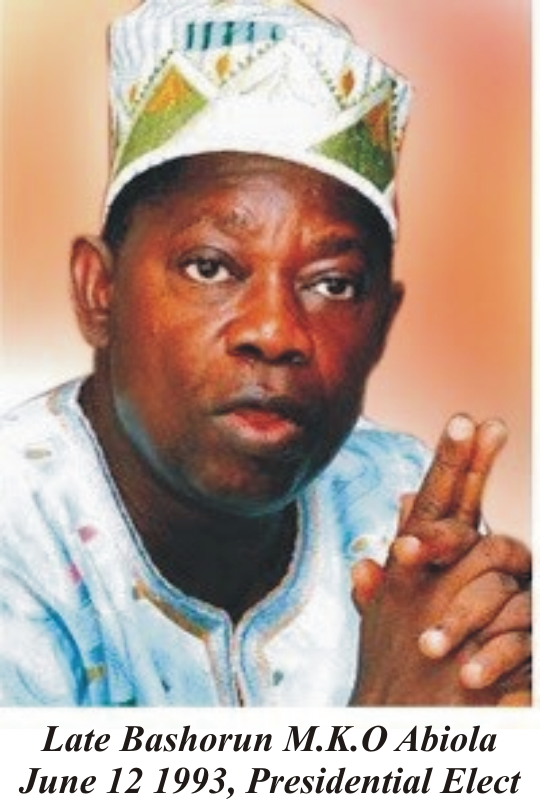
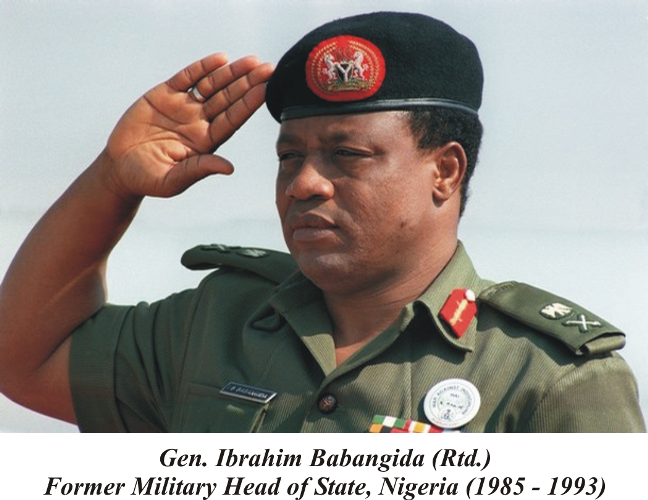 The amount
and specificity of detail you provide is dazzling. And yet there were so many
intrigues and secrets surrounding the annulment of the elections on June 12
1993.
The amount
and specificity of detail you provide is dazzling. And yet there were so many
intrigues and secrets surrounding the annulment of the elections on June 12
1993.
The reason behind the mystery and intrigues is that the June 12 victory itself created several complications for different groups of people. The 'political' army officers, particularly from the Core North and to an extent, the Middle Belt; didn't want MKO Abiola to rule- even if he had won an election. The political leaders and traditional rulers also didn't expect a non-northerner to command the kind of popularity and acceptance Abiola enjoyed. So, they tacitly approved the annulment so that power will one way or the other remains in the North. Several politicians from the South, (all of whom were mentioned by name and their individual roles were revealed in my book); also didn't want Abiola to rule also agreed with the military on the annulment.
Even Bashir Tofa, the opposition NRC presidential candidate who was defeated by Abiola and who had initially conceded defeat and even sent a congratulatory message to Abiola, was put under immense pressure to challenge the SDP victory.
Thus the annulment was not only carried out by Babangida and his cabal of inner circle officers; it was also quietly supported by the majority of the Northern political leaders and traditional leaders. Some voices like Balarabe Musa, Abubakar Dangiwa Umar, Shehu Sani, Bagauda Kaltho, Rabiu Musa Kwankwaso and so on also resisted the unfortunate decision, but they were not in the majority.

Tell us about your experience researching the book.
It was immensely challenging because I had to read over 15 books by different authors and I had to sift through many of the news magazines of that era like Tell, The News, African Concord and so on; just to cross reference most of the facts I had read from books and to piece them together in order to recreate the realistic timeline so that everything could be put together properly and the multiple events seen through the eyes of the many key players of that era.

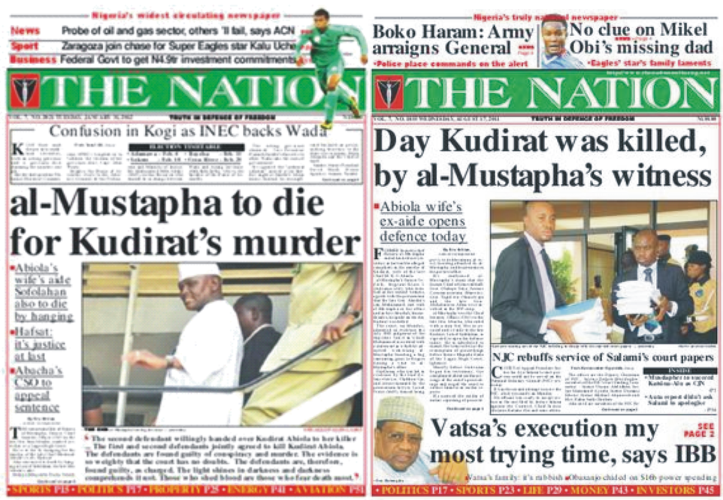
As I said earlier, that day was a slap in the face of Nigeria’s democratic hopes. Quite possibly June 12 was the first time we had been so harshly confronted with the realities of living under military rule. Do you think it changed Nigerians in any significant way?
I believe it changed Nigeria in every way. Yes, that period, I mean 1993 till 1999...it was the first time ever that Nigerians from all over the country will withstand the military in unison and through a war of attrition, civilians insisted and Babangida was forced to permanently step aside, the resistance of Nigerians led to the collapse and overthrow of Shonekan's Interim Government and despite the brutality of the Abacha regime, he himself was turned into a paranoid husk, voluntarily imprisoning himself in Aso Rock.
The phantom coups of 1995 and 1998 were not believed by the masses. They could smell a government frame up miles away. Even when Abacha suddenly died in June 1998, the whole country rejoiced.

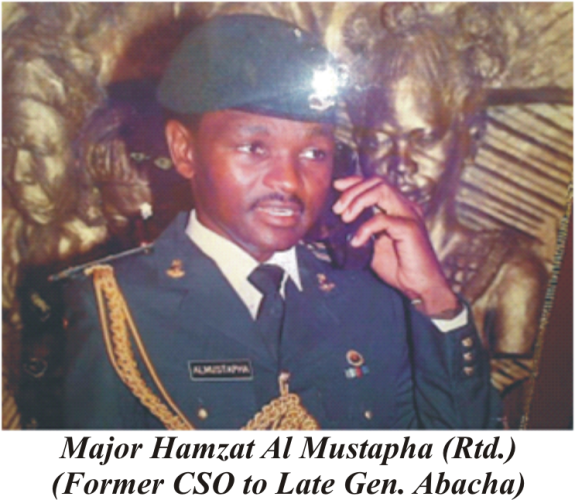
President Ibrahim Babangida was known not only in Nigeria but across Africa as ‘Maradona’ because of his prowess, his ‘dribbling’ as a politician. But your portrayal of him in the book will take many people by surprise. You depict him as a ‘tortured soul’, a puppet of powers beyond him. Take us briefly on your journey to that conclusion.
I depicted him the way he really was at that time. Although, no excuse can be tenable for annulling the June 12 results; but the truth is that he was threatened...his life and that of his family's. In movies, we tend to cast the protagonists as heroes and the antagonists as villains but in nonfiction stories, that's not really the way things are...even the so called villains have a story on why they are the way they are.
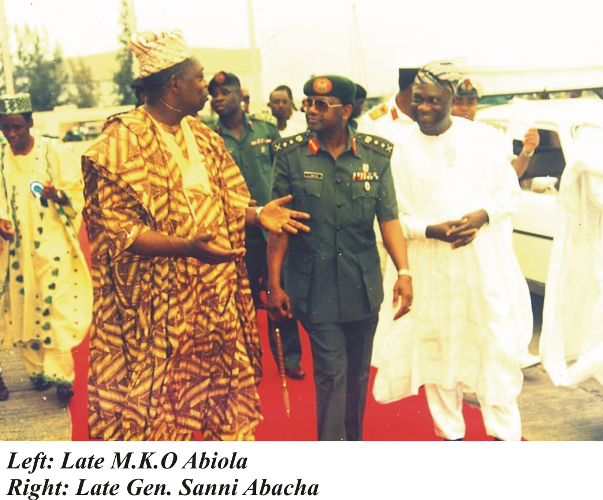 I concede that his
'dribbling' was what led him to that point but June 12 was something
he couldn't dribble his way out of.
I concede that his
'dribbling' was what led him to that point but June 12 was something
he couldn't dribble his way out of.
He was caught between the IBB boys and the Lagos Group, not to talk of Abiola's total refusal to be bought or threatened into abandoning the June 12 mandate.
The IBB boys were led by Lt. General Joshua Nimyel Dogonyaro and the young and dashing Brigadier David Mark (all of whom were based in Abuja) and the Lagos group, led by General Sani Abacha and Major General Oladipo Diya. The IBB boys didn't want him to hand over to Abiola (as they couldn't imagine their future under an Abiola presidency).
The Lagos group were a group of officers working at the Defence Headquarters. This group was led by the Defence Minister himself~ General Sani Abacha, arguably the most powerful military officer at the time. Abacha also couldn't imagine a future under an Abiola presidency. He had to put so much pressure on Babangida (who had promised him that he'll rule Nigeria after his own reign and who also had a morbid fear of him) as a way of causing a political crisis that will be a perfect pretext for taking over power, even if it's in a false garb of a democratic crusader.

The military ruled Nigeria for much of the 1980s and 90s and arguably brought the country to its knees, politically and economically, spawning one of the largest diasporas populations in the world. How does your book help us to understand the power dynamics and workings of the military complex?
You see, same group that carried out the bloody counter coup of July 28th 1966- led by Murtala Mohammed and were never prosecuted (or those that benefited directly or indirectly from it) are the same group of people that ruled Nigeria from the late 1960s till late 1990s. They've equally been very busy with installing presidents since 1999. Even now, they are still busy with who will rule over Nigeria.
Many foremost politicians and statesmen that we know or hear about now were military officers who shed their uniforms for Agbada. Some of them like Olusegun Obasanjo, Ibrahim Babangida, Abdulsalam Abubakar, Muhammadu Buhari, Senator David Mark, Senator Jeremiah Useni, former governor Murtala Nyako, former governor Jonah Jang and so on were all there in uniform either before or during the June 12 crisis.
The book helps us identify and understand who they are and why they do the things they do even in today's Nigeria.

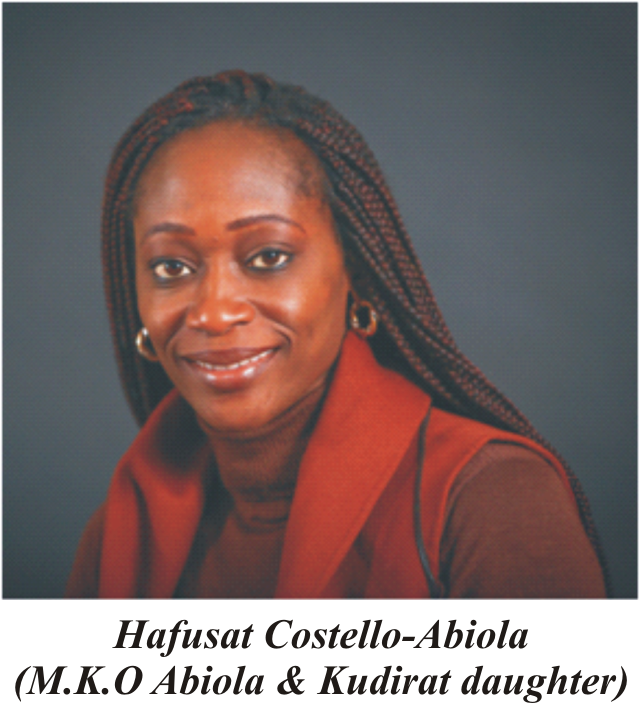
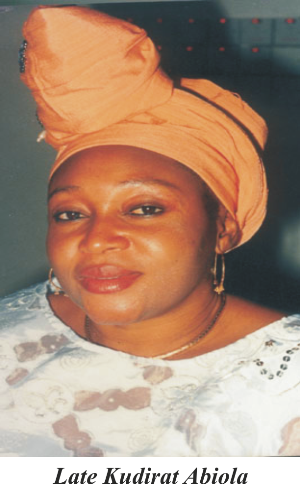 And finally,
what do you want readers to take away from this book?
And finally,
what do you want readers to take away from this book?
The truth of what happened; so that as the Federal Government has now made June 12 Nigeria's Democracy Day (as it should have been), parents will be able to authoritatively recount to their children on what happened in that era and what's more, perhaps purchase copies for their family libraries so that from generation to generation, the history of Nigeria will ever be fresh in the minds of her proud people! Click Here to get a copy




I am drawn to people of mixed-cultural descent and of mixed-race heritage. I'm also drawn to ...
David Aguilar, born in Andorra, is an inspiring figure known for his resilience and crea ...